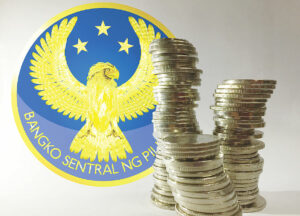
Gov’t upsizes T-bill award as rates of all tenors drop
THE GOVERNMENT upsized the volume of Treasury bills (T-bills) it awarded on Monday as rates dropped across all tenors amid strong demand and expectations of a US Federal Reserve cut in June.
The Bureau of the Treasury (BTr) raised P17 billion from the T-bills it offered on Monday, above the P15-billion plan, as total bids reached P47.75 billion or more than thrice the amount on the auction block.
Broken down, the BTr borrowed P5 billion as programmed from the 91-day T-bills as tenders for the tenor reached P12.928 billion. The three-month paper was quoted at an average rate of 5.704%, 0.6 basis point (bp) lower than the 5.71% seen last week. Accepted rates ranged from 5.655% to 5.75%.
The government likewise made a full P5-billion award of the 182-day securities, with bids reaching P16.26 billion. The average rate for the six-month T-bill stood at 5.865%, down by 1.5 bps from the 5.88% fetched last week, with accepted rates at 5.845 to 5.885%.
Meanwhile, the Treasury raised P7 billion via the 364-day debt papers, more than the P5-billion plan, as tenders for the tenor totaled P18.562 billion. The average rate of the one-year T-bill went down by 1.7 bps to 5.965% from the 5.982% quoted for a P5-billion award last week. Accepted yields were from 5.945% to 5.985%.
Strong demand for the one-year T-bill prompted the BTr to double the accepted volume of non-competitive bids for the tenor, it said in a statement on Monday.
At the secondary market on Monday before the auction, the 91-, 182-, and 364-day T-bills were quoted at 5.7254%, 5.9181%, and 6.074%, respectively, based on PHP Bloomberg Valuation Service Reference Rates data provided by the BTr.
“The lower awarded rates reflected bolstered views of a June US policy rate cut following the softer-than-expected US personal consumption expenditures (PCE) inflation report for February,” a trader said in an e-mail.
US prices moderated in February, with the cost of services outside housing and energy slowing significantly, keeping a June interest rate cut from the Federal Reserve on the table, Reuters reported.
The PCE price index rose 0.3% last month, the Commerce department’s Bureau of Economic Analysis said. Data for January was revised higher to show the PCE price index climbing 0.4% instead of 0.3% as previously reported. Economists polled by Reuters had forecast the PCE price index gaining 0.4% on the month.
In the 12 months through February, PCE inflation advanced 2.5% after increasing 2.4% in January.
Though price pressures are subsiding, the pace has slowed from the first half of last year, and inflation remains above the US central bank’s 2% target.
Fed Chair Jerome H. Powell said on Friday February’s inflation data was “more along the lines of what we want to see.”
Fed officials last month left the central bank’s policy rate unchanged in the current 5.25%-5.5% range, having raised it by 525 bps since March 2022.
Policy makers anticipate three rate cuts this year. Financial markets expect the first rate reduction in June.
T-bill rates declined ahead of the release of Philippine inflation data for March this week, Rizal Commercial Banking Corp. Chief Economist Michael L. Ricafort said in a Viber message.
A BusinessWorld poll of 17 analysts conducted last week yielded a median estimate of 3.8% for March headline inflation.
If realized, this would be faster than the 3.4% print in February, but slower than the 7.6% rate recorded in the same month a year ago. This would also be within the Bangko Sentral ng Pilipinas’ (BSP) 3.4%-4.3% estimate for the month.
This would mark the second straight month that inflation picked up on a monthly basis and the fourth straight month that the consumer price index (CPI) was within the BSP’s 2-4% annual target.
The Philippine Statistics Authority will release March CPI data on April 5, Friday.
On Tuesday, the BTr will offer P30 billion in reissued seven-year Treasury bonds (T-bonds) with a remaining life of six years and nine months.
The Treasury is looking to raise P195 billion from the domestic market this month, or P75 billion through T-bills and P120 billion via T-bonds.
The government borrows from local and foreign sources to help fund its budget deficit, which is capped at 5.1% of gross domestic product this year. — A.M.C. Sy with Reuters



